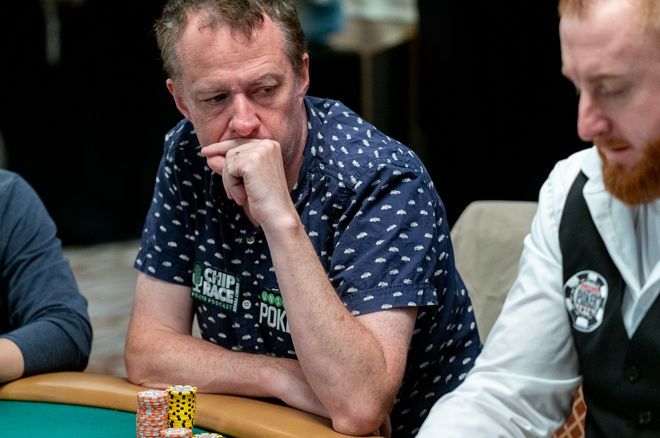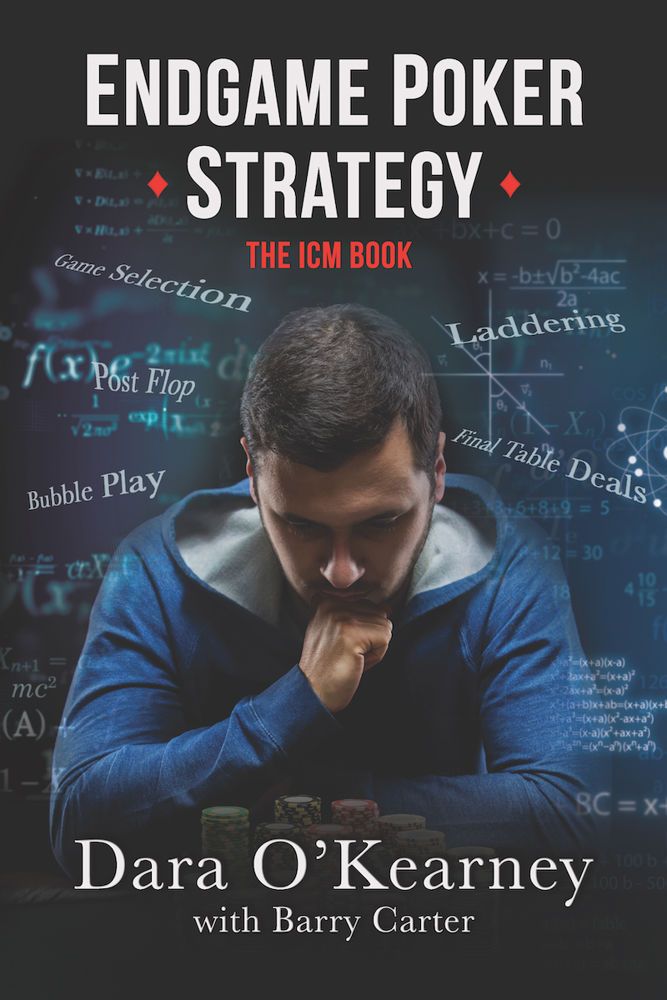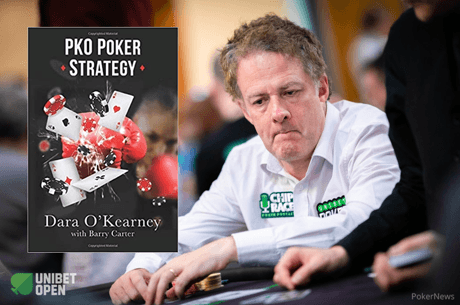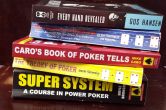How to Accumulate Chips When You Are Laddering

Table Of Contents
In my new book Endgame Poker Strategy: The ICM Book we take a deep dive into the subject of the Independent Chip Model (ICM). We go deeper than any book has into this area and we also clear up a lot of misconceptions players have about ICM.
The biggest misconception of all is around laddering. Some players try so hard to ladder that they pass profitable spots and blind away to nothing. Other players dismiss the fact that the most profitable way to play often means playing tighter and letting shorter stacks bust first.
Both of these are errors, often very costly. The endgame usually comes down to short stacks so players assume it��s not that important and mostly luck. The reality is that the biggest money decisions you make are at final tables, a ten big blind error often defines how the poker year went for you, so it��s important to get them right.
Pick Your Spots Carefully
We have to play tighter when ICM is pressuring us, but we also have to accumulate chips. These two ideas seem at odds with each other. In order to accumulate chips we have to risk being eliminated. Is it just a case of folding your stack away until you find a big hand?
It��s not about waiting for a better spot, it��s about taking different spots. Let��s look at an example. These are the final five players in an MTT, their chips, their potential payout if they maintain their current position and the ICM value of their stack:
| Player | Potential Payout | Stack | Equity |
|---|---|---|---|
| 1 | $49 | 20,000 | $30.58 |
| 2 | $32 | 16,000 | $27.78 |
| 3 | $18 | 12,000 | $24.41 |
| 4 | $12 | 10,000 | $22.47 |
| 5 | $9.50 | 4,000 | $15.26 |
Let��s say we are Seat 4 where we find ourselves in the tricky spot of needing to accumulate chips but also not wanting to bust out with such a short stack (Seat 5) at the table. These are the Bubble Factors of each player against each player:
| Seat 1 (20k) | Seat 2 (16k) | Seat 3 (12k) | Seat 4 (10k) | Seat 5 (4k) | |
|---|---|---|---|---|---|
| Seat 1 (20k) | 1.52 | 1.29 | 1.22 | 1.07 | |
| Seat 2 (16k) | 1.83 | 1.37 | 1.26 | 1.08 | |
| Seat 3 (12k) | 1.68 | 1.6 | 1.34 | 1.09 | |
| Seat 4 (10k) | 1.6 | 1.53 | 1.46 | 1.1 | |
| Seat 5 (4k) | 1.25 | 1.22 | 1.19 | 1.17 |
Read More: Dara O'Kearney Releases Poker Book on Satellite Strategy
If you are unfamiliar with Bubble Factor, we go into it in great detail in the new book. Among other things it shows you how much equity you need to justify calling all-in in the late stages of a tournament. Until you read the book, for now all you need to know is the higher the number, the tighter your call has to be. It would be a disaster for Seat 2 to call an all-in from Seat 1 because they are 2nd in chips, so their Bubble Factor is very high. Seat 5 needs to find a double up from somewhere or their will likely be the next out, so by contrast their Bubble Factor is low against Seat 1 (it��s even lower against Seat 4, the 2nd shortest, because doubling up against them would mean they are no longer the short stack).
Seat 4 cannot wait around forever, they have to accumulate chips while also avoiding elimination. It��s much easier to be the big stack or the short stack in these spots because you don��t have to worry about elimination, you are either not at risk or you know your most likely to bust so you can throw caution to the wind.

Three Key Factors
Three factors are important when trying to accumulate chips. Position is perhaps the single most important factor when deciding whether to shove as one of the shorter stacks. The later the better. If you are the Button you only have to worry about two other players, which means you can comfortably push a wide range knowing you will get a lot of folds and get called by a wider range when you are called. So if you were Seat 4 you should be using your Button and Small Blind pots, when folded to, to target the remaining players for aggression.
Who you target is important. In the example above if Seat 1 has a low Bubble Factor of 1.22 when Seat 4 shoves. They can call quite wide against them. Seat 3, however, almost has the same amount of chips as Seat 4, as such their Bubble Factor against them is 1.34. Targeting the shortest stack, Seat 5 is the biggest mistake, because they need to accumulate chips their Bubble Factor is just 1.07, which is almost the same as if it were a cash game with no ICM pressure. So in this example Seat 4 should target the player who stands to lose the most from tangling with them, Seat 3 who has almost the same stack as Seat 4.
PokerNews Book Review: Dara O'Kearney's PKO Poker Strategy
The other important factor is having blockers in your hand. When you push with an Ace or a King in your hand you remove the two of the most likely cards that will call you. You are often better off pushing with an Ace with a bad kicker than you are with a small pair in the late stages of a tournament because of this card removal effect.
When you have an Ace in your hand it makes it less likely your opponent has one. Because you need a tighter calling range in tournaments, you are more likely to get folds when you have an Ace in your hand because the typical calling ranges in late stage poker are mostly made up of AA, AK, KK, QQ, JJ hands. If you raise with pocket twos there are 16 potential combinations of AK and six combinations of AA out there, for example, but if you raise with A2s there are only 12 combinations of AK and three combinations of AA. You will run into a big Ax hand 30% less often in this example with A2s than you will with 22.
So the answer to the question ��should I ladder or play for the win�� is to do both, just change the way you do it. When you are one of the shorter players at the table, your checklist should be to:
- Only call with strong hands
- Push a wider range in late position, ideally with blocker hands
- Target the players who would be most hurt by you and avoid the players with nothing to lose
Dara O��Kearney is the author of Endgame Poker Strategy: The ICM Book �C the first book to take a detailed dive into ICM in poker tournaments.









